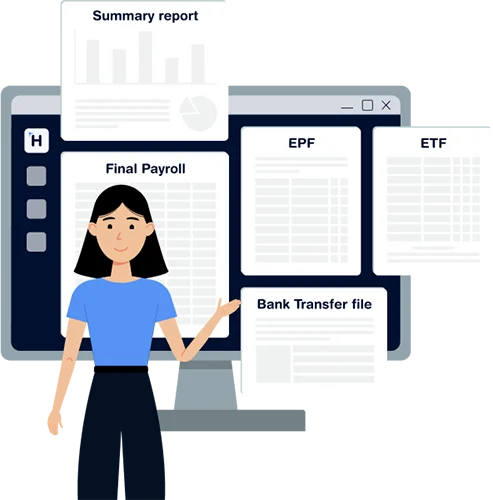Now that you have started your own business or are looking to formalize your business, managing your employees is going to involve certain tasks that can be challenging at first.
A main component of your obligations towards your employees as part of their employment contracts is the payment of salaries or payroll. It is not a straightforward matter, however, as Sri Lanka’s labour laws and tax regulations involve a lot of bureaucracy and regulatory requirements that you will have to manage on a monthly basis when running payroll. As such, there is considerable responsibility that employers have to shoulder in taking care of their employees while also ensuring compliance with the various labour and tax stipulations of the government. But it can be overwhelming to keep track and follow each one properly, with laws and regulations changing frequently.
So here we discuss the key components of employee salaries and running payroll as a small business or startup in Sri Lanka.
In our own research previously, we noticed that there wasn’t a comprehensive online resource detailing how Sri Lankan businesses can handle payroll. Therefore, in this article, we have discussed the main payroll aspects that you need to consider, strengthened by Gazette notifications and related Government authority resource links.
This article aims to provide you with a simple outline to get you started with payroll or to help you formalize your current process. For ease of understanding, we have listed all the payroll components under two types; main salary items and regulatory compliant salary items.
Below, you can click on the exact payroll topic you want to know about straight away, to go to that topic. Or you can read everything from the beginning till the end for a fuller understanding.
Main Salary Items
When you recruit a new employee to your organisation and you have already interviewed and settled on your ideal candidate, you will know what his job description will be and what his remuneration package or salary looks like. Now assuming you will be recruiting this new employee on a monthly salary basis, the following are the main salary items that you need to consider.
Basic Salary
This is the amount of money a salaried employee regularly earns before any additions or deductions are applied to their earnings. You can decide on your employees basic salary by benchmarking against the basic salaries of your competition and by determining how much cost the company is willing to bear to employ his services.
When it comes to Sri Lankan labour laws, you should make sure that you are paying your employees the government mandated minimum wage. This minimum wage depends on your industry. You can refer to the Extraordinary Gazette No 1668_19 - 27 August 2010 for the minimum wage for each industry. There is also a recent amendment on the National Minimum Wage Of Workers Act, No. 3 OF 2016 that came into force in 2021.
Allowances
An allowance is an amount of money given or allotted usually at regular intervals for a specific purpose. For example, if your business requires your employee to travel to places you will pay him a travel allowance. There can be two types of allowances, namely fixed and variable allowances.
- Fixed allowances as the name suggests do not change each month, it will be pre defined and allotted to the employee on a monthly basis. For example, a mobile allowance could be a fixed one for a sales person.
- Varied allowances are the ones that change each month according to the usage. For example, an employee in charge of product deliveries might receive a travel allowance based on the mileage he traveled.
Apart from the basic salary and allowances, the employment contract of your employees will most likely specify the following salary items.
Bonus
A bonus is a sum of money added to a person’s wages as a reward for good performance and it is typically calculated as a percentage of the employee’s salary. Bonus amounts may also differ depending on seniority, whereas a bonus percentage might grow each year an employee remains with the company, for example. High level executives might receive large bonuses, sometimes a third or even half of their salary.
Incentives
In a business where high performance leads to more profits, employees can be motivated to improve quantity and quality by defining an incentive scheme. The idea is to award a sum of money if they hit certain targets.
No Pay Deductions
No pay is tied to attendance. There is a government-defined minimum number of leave that an employer has to allocate. As long as you fulfill this requirement and don’t override government regulations, there can also be rules regarding paid and unpaid leave unique to your organisation. There is a proper process of requesting and being approved for leave in most companies. When an employee fails to adhere to these standards, it could lead to unauthorized leave, meaning it could be deducted from his salary.
Salary Advance
It acts as a loan where employees are allowed to request a sum of money in advance out of the actual monthly salary. It will be duly deducted from the next month’s salary.
Loan Payments
If your company offers loans to employees, your loan payments will be collected in installments with your salary.
Regulatory Salary Items
When considering payroll processing in Sri Lanka, there are a few more elements that you need to take into consideration concerning being compliant with the law. These components have to be processed together with your employees’ monthly salaries or compensation.
Employee Provident Fund, Employee Trust Fund, and Gratuity payments as well as APIT tax and Stamp Duty are some of the main items that will be considered in your monthly payroll apart from your basic salaries, allowances and bonuses. These will also involve commitments and tasks such as making remittances and submission of documents that will be processed annually, half yearly or quarterly concerning these items. Below, we will briefly discuss how these items relate to your monthly payroll and you can also click the link provided to read more about each of them and how to incorporate them into your payroll.
EPF
EPF for short, this is one of the social security mechanisms set in place for private sector employees by the government. It acts as a safety net when employment has ceased after retirement or due to illness.
Here both you and your employee will contribute to the fund. You; the employer should contribute an amount equal to 12% of his total earnings while the employer should provide an amount equal to 8%. This 8% will be calculated and dedicated from the employees monthly salary, whereas the 12% should be derived solely from the employer. Together it makes up a contribution of 20% which the employer should process and remit to the fund.
Click to check full details on EPF
ETF
Similar to EPF, this is also a social security scheme which acts almost like an insurance where your employees will be able to claim benefits under 9 different benefit schemes. This is a non-contributory fund for members (employees) where only the employer should contribute an amount equal to 3% of the employees monthly earning to the fund. This is calculated alongside monthly payroll but should be remitted to the fund by the employer.
Click to check full details on ETF
Gratuity
Also a social security scheme for private sector employees, which as the name suggests aims to award the most loyal employees of the company. If you have 15 or more employees employed on any day during a 12-month period, you are liable to pay gratuity for employees who have completed five years or more of service prior to termination.
Click to check full details on Gratuity
APIT
Advance Personal Income Tax (APIT) is the taxation on personal income generated by individuals working in Sri Lanka. Your employees might be taxable if they fall into categories specified under the 7 different tax tables under this tax. Employees can choose to allow their employer to collect and remit APIT on their behalf.
Click to check full details on APIT
Stamp Duty
Stamp Duty is another type of tax collected by the Inland Revenue Department. Out of its 9 different tax instruments, the last instrument mandates that a receipt or discharge given for any money or other property with value exceeding 25,000 rupees is taxed at a flat rate of 25 rupees.



